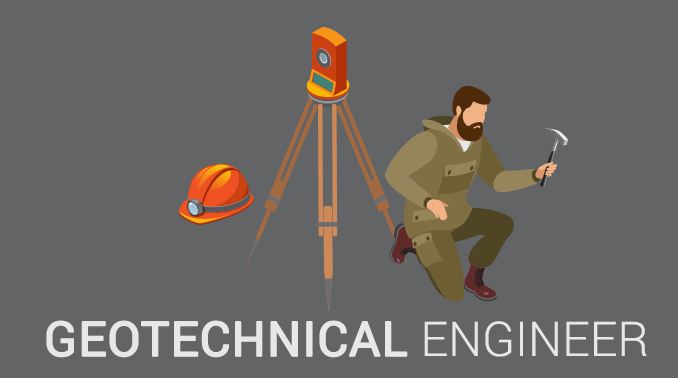Geotheta - The Facts
Geotheta - The Facts
Blog Article
The Only Guide for Geotheta
Table of ContentsThe Facts About Geotheta RevealedGeotheta Can Be Fun For AnyoneThe Single Strategy To Use For GeothetaSome Known Questions About Geotheta.Not known Incorrect Statements About Geotheta

They carry out site investigations, gather samples, perform laboratory tests, and assess information to evaluate the suitability of the ground for construction tasks - Engineer of Record. Based upon their searchings for, geotechnical engineers give recommendations for foundation design, slope stability, keeping structures, and mitigation of geotechnical dangers. They collaborate with other experts, such as designers, structural engineers, and building groups, to make sure that geotechnical factors to consider are integrated right into the overall task style and implementation
By assessing the behavior and residential properties of soil and rock, they can identify prospective geotechnical hazards such as landslides, dirt negotiation, or slope instability. Their expertise aids stop failures or crashes that might threaten lives and residential or commercial property. Right here are some detailed duties and obligations of a geotechnical designer: Website Examination: Geotechnical designers conduct site investigations to collect information on subsurface conditions.
They translate the information to comprehend the residential or commercial properties and habits of the dirt and rock, including their strength, leaks in the structure, compaction characteristics, and groundwater conditions. Geotechnical Evaluation and Layout: Geotechnical designers analyze the data collected during site examinations to evaluate the stability and suitability of the website for building and construction tasks. They perform geotechnical calculations and modeling to assess aspects such as birthing ability, settlement, incline stability, side planet stress, and groundwater flow.
The Buzz on Geotheta
Structure Layout: Geotechnical engineers play a crucial duty in making foundations that can securely support the desired structure. They analyze the dirt problems and load requirements to identify the proper foundation kind, such as superficial foundations (e.g., grounds), deep structures (e.g (https://www.twitch.tv/geotheta/about)., heaps), or specialized techniques like dirt renovation. They take into consideration variables such as negotiation limits, birthing capacity, and soil-structure communication to establish ideal foundation layouts
They examine building strategies, display site activities, and perform area assessments to confirm that the style recommendations are adhered to. If unpredicted geotechnical concerns develop, they assess the situation and offer recommendations for remediation or changes to the layout. Risk Analysis and Mitigation: Geotechnical engineers assess geotechnical dangers and dangers connected with the task site, such as landslides, liquefaction, or dirt disintegration.

Partnership and Interaction: Geotechnical engineers function closely with various other professionals involved in a task, such as architects, structural designers, and building groups. Effective interaction and collaboration are necessary to integrate geotechnical considerations right into the general project style and building and construction process. Geotechnical designers give technical competence, solution queries, and ensure that geotechnical requirements are satisfied.
Geotheta Can Be Fun For Everyone
Below are some kinds of geotechnical designers: Foundation Designer: Foundation engineers specialize in making and evaluating foundations for structures. They examine the dirt conditions, load needs, and website qualities to figure out one of the most ideal foundation type and layout, such as superficial structures, deep structures, or specialized methods like pile structures.
They review the aspects influencing slope stability, such as soil homes, groundwater problems, and slope geometry, and create methods to avoid slope failings and mitigate dangers. Earthquake Engineer: Earthquake engineers specialize in evaluating and designing frameworks to withstand seismic pressures. They assess the seismic danger of a website, examine dirt liquefaction capacity, and create seismic design criteria to ensure the safety and durability of frameworks during earthquakes.
They carry out area testing, collect samples, and examine the collected information to identify the soil buildings, geologic developments, and groundwater conditions at a site. Geotechnical Instrumentation Engineer: Geotechnical instrumentation engineers concentrate on monitoring and gauging the actions of dirt, rock, and frameworks. They install and keep instrumentation systems that monitor elements such as dirt negotiation, groundwater levels, slope motions, and structural variations to assess performance and supply early cautions of prospective concerns.
The 45-Second Trick For Geotheta
They conduct tests such as triaxial tests, combination tests, straight shear examinations, and permeability tests to gather information for geotechnical evaluation and design. Geosynthetics Engineer: Geosynthetics designers concentrate on the design and application of geosynthetic products, such as geotextiles, geogrids, and geomembranes. They use these products to improve soil stability, enhance inclines, provide drainage options, and control disintegration.
They often tend to be investigatory people, which suggests they're intellectual, introspective, and analytical. They are curious, methodical, rational, logical, and logical. Some of them are also social, meaning they're kind, charitable, participating, individual, caring, handy, understanding, sensible, and pleasant - Geo Tech Engineer.
In the workplace atmosphere, geotechnical important source engineers utilize specialized software devices to do computations, create styles, and examine data. They prepare reports, evaluation job requirements, communicate with clients and staff member, and coordinate task tasks. The workplace setup supplies a conducive environment for study, analysis, and cooperation with various other experts associated with the project.
All About Geotheta
They regularly go to task sites to perform site investigations, evaluate geotechnical problems, and collect data for evaluation. These gos to entail traveling to different areas, in some cases in remote or tough terrains. Geotechnical designers may do soil tasting, conduct examinations, and monitor construction activities to make certain that the geotechnical aspects of the job are being applied correctly.
Geotechnical designers also function in specialized geotechnical laboratories. Geotechnical research laboratory engineers work extensively in these environments, handling screening tools, running tools, and tape-recording data.
Report this page